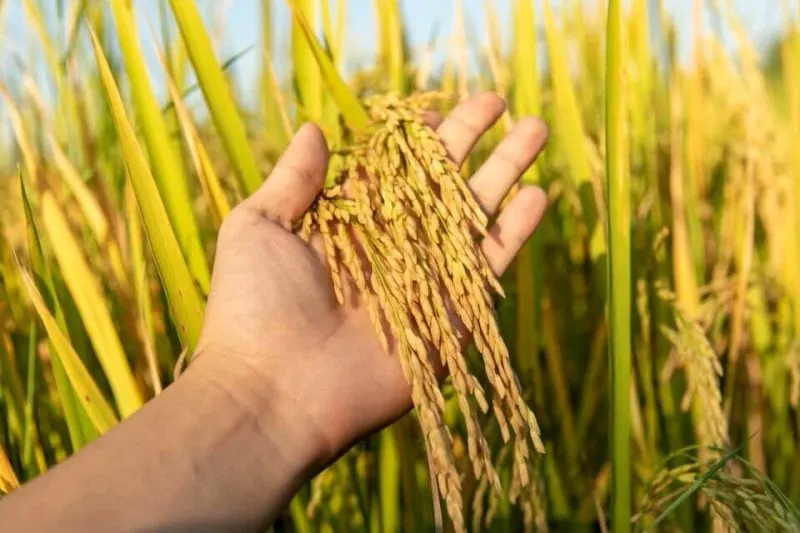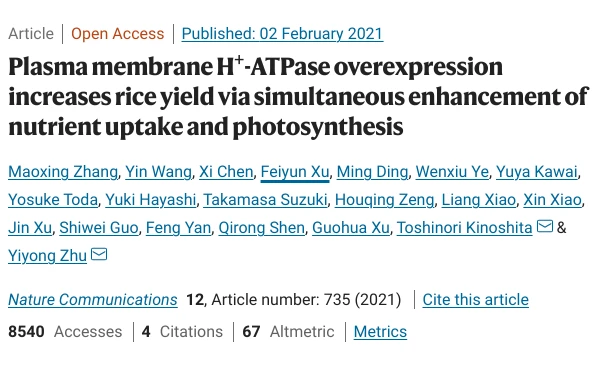More for less: Biotech approach increases rice yields with fewer nitrogen inputs
More for less: Biotech approach increases rice yields with fewer nitrogen inputs


From jollof to arroz con camarones, jambalaya to biryani, rice is a hallmark of most cuisines. In fact, rice is the most widely produced crop for direct consumption. Countless varieties with unique qualities are grown across a huge range of landscapes.
Crop improvements made in rice are amplified by the vast global acreage its production occupies. It is therefore no wonder that researchers often investigate yield advances specifically in this crop.
The impositions of a rapidly expanding population and climate change on an already fragile food system are daunting. It is therefore of utmost importance that rice production is safeguarded.
Modern rice varieties developed by breeding rely heavily on nitrogen inputs to produce high yields. Synthetic nitrogen production is energetically costly, comprising nearly 40 percent of the total energy cost of rice production.
What’s more, rice yield improvement facilitated by conventional breeding methods have plateaued. However, alternate biotechnological interventions can provide a promising mechanism to overcome yield stagnation. In the face of climate change resulting from anthropogenic greenhouse gases and a rapidly growing population it is imperative to reduce the carbon footprint of agricultural systems while increasing yield.
This gargantuan task has recently been attempted by Zhang et al, as published in Nature. By over-expressing a single native rice gene, researchers were able to simultaneously increase yield and nitrogen use efficiency in field trials by 33 percent and 46 percent, respectively.

Increasing the expression of the rice gene OSA1, a membrane-localized proton pump involved in multiple physiological processes such as root nitrogen uptake and stomatal conductance, proved remarkably effective. Plants with greater OSA1 expression were better able to accumulate nitrogen in the form of ammonia from the paddy and carbon from the atmosphere via stomata. Collectively, this biotechnological approach yielded rice crops with higher yields and more efficient use of nitrogen across a range of varied test plot environments.
These exciting outcomes were achieved by increasing the expression of a single native rice gene. Consumer fears regarding the use of genes from foreign organisms would hopefully be assuaged by this approach, in which no new genes need be introduced. Rather, the level of a native rice gene is simply modulated.
The work produced by Zhang et al. is an exciting opportunity to significantly enhance rice yields while lowering requisite nitrogen inputs. Mounting impacts of climate change alongside growing populations create a pressing need for innovations that can simultaneously address the opposing demands of yield and agricultural input efficiency. Zhang et al. have miraculously achieved one such breakthrough in their exciting new work.
Adapting this technology to be entirely free of foreign genes and into varieties that are widely produced is necessary before growers can begin to benefit from this innovation.
Nicholas Karavolias is a PhD candidate in the Staskawicz Lab at the University of California, Berkeley, a National Science Foundation Graduate Research Fellowships Program recipient and a FFAR Fellow.
A version of this article was originally posted at the Cornell Alliance for Science and is reposted here with permission. The Cornell Alliance for Science can be found on Twitter @ScienceAlly

 | Videos | More... |

Video: Nuclear energy will destroy us? Global warming is an existential threat? Chemicals are massacring bees? Donate to the Green Industrial Complex!
 | Bees & Pollinators | More... |

GLP podcast: Science journalism is a mess. Here’s how to fix it

Mosquito massacre: Can we safely tackle malaria with a CRISPR gene drive?

Are we facing an ‘Insect Apocalypse’ caused by ‘intensive, industrial’ farming and agricultural chemicals? The media say yes; Science says ‘no’
 | Infographics | More... |

Infographic: Global regulatory and health research agencies on whether glyphosate causes cancer
 | GMO FAQs | More... |

Why is there controversy over GMO foods but not GMO drugs?

How are GMOs labeled around the world?

How does genetic engineering differ from conventional breeding?
 | GLP Profiles | More... |

Alex Jones: Right-wing conspiracy theorist stokes fear of GMOs, pesticides to sell ‘health supplements’




 Viewpoint — Fact checking MAHA mythmakers: How wellness influencers and RFK, Jr. undermine American science and health
Viewpoint — Fact checking MAHA mythmakers: How wellness influencers and RFK, Jr. undermine American science and health Viewpoint: Video — Big Solar is gobbling up productive agricultural land and hurting farmers yet providing little energy or sustainabilty gains
Viewpoint: Video — Big Solar is gobbling up productive agricultural land and hurting farmers yet providing little energy or sustainabilty gains Trust issues: What happens when therapists use ChatGPT?
Trust issues: What happens when therapists use ChatGPT? Fighting deforestation with CO2: Biotechnology breakthrough creates sustainable palm oil alternative for cosmetics
Fighting deforestation with CO2: Biotechnology breakthrough creates sustainable palm oil alternative for cosmetics California, Washington, Oregon forge immunization alliance to safeguard vaccine access against federal undermining
California, Washington, Oregon forge immunization alliance to safeguard vaccine access against federal undermining 30-year-old tomato line shows genetic resistance to devastating virus
30-year-old tomato line shows genetic resistance to devastating virus The free-range chicken dilemma: Better for birds, but with substantial costs
The free-range chicken dilemma: Better for birds, but with substantial costs ‘You have to treat the brain first’: Rethinking chronic pain with Sanjay Gupta
‘You have to treat the brain first’: Rethinking chronic pain with Sanjay Gupta
